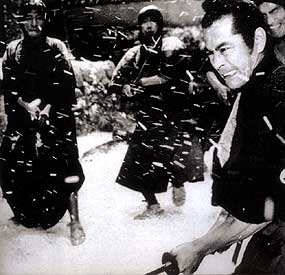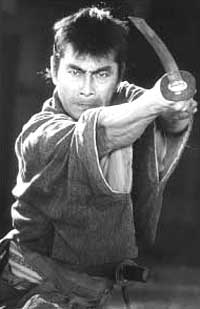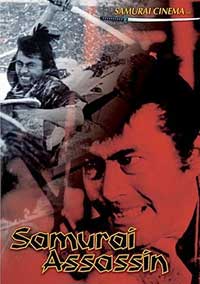 Samurai Assassin painstakingly documents events leading up to the Sakarada Gate Incident, culminating in a gory extended sword battle with Toshiro Mifune carting away a high ranking official's head on his sword's point screaming about his mighty success, never knowing he killed his own father (Hirata Akihikko).
Samurai Assassin painstakingly documents events leading up to the Sakarada Gate Incident, culminating in a gory extended sword battle with Toshiro Mifune carting away a high ranking official's head on his sword's point screaming about his mighty success, never knowing he killed his own father (Hirata Akihikko).
To get to this point Mifune's character Niiro Tsuruchiyo has to kill his best friend, scholar & swordsman Karihara Einosuke (Kobayashi Keiju), only to learn afterward that the man was not a traitor to the assassination group as believed.
This is of the "cruel jidaigeki" subgenre that gave us Kobayashi's Harakiri (1962) & Samurai Rebellion (1967) & Okamoto's own Sword of Doom (1966). But it falls flat; the cruelties of Samurai Assassin don't impact the viewer as all that tragic as the film in its total was not sufficiently about the people caught up in the events, but focused too much on the historical context.
As Niiro's elderly foster father (Eijiro Tono), a merchant, tries at the last possible minute to change the cruel fate of his adopted son by revealing the identity of his true father, the thing that stands out is not that fate cannot be averted in a cruel world, but that none of it needed to happen at all if anyone would just have told Niiro the one thing he had always wanted to know, whether days or years earlier. Raising him to know he was a samurai's bastard but then denying him knowledge of who that would be was the recipe for disaster; it had nothing to do with fate.
 Aratama Michiyo plays Okiku who runs an inn, a look-alike for a lost love of Niiro's past. Niiro hangs around the inn running up a debt he cannot pay & being quite threatening to Okiku, but she falls for him in spite of all. A doorway to happiness is placed before Niiro, who of course turns away from the humane choice to pursue the samurai heritage that belonged to him by right of skill & bastardy. Aratama Michiyo plays Okiku who runs an inn, a look-alike for a lost love of Niiro's past. Niiro hangs around the inn running up a debt he cannot pay & being quite threatening to Okiku, but she falls for him in spite of all. A doorway to happiness is placed before Niiro, who of course turns away from the humane choice to pursue the samurai heritage that belonged to him by right of skill & bastardy.
Kihachi Okamoto is a fine filmmaker & this one's visually quite beautiful. But it's the second-weakest of his swordplay films -- after Zatoichi vs. Yojimbo (1970), a low point for the Zatoichi series despite the star power & the noteworthy director.
The main failure of the film is that not as much happens as my rough outline above might indicate. Most of the film is spent revealing the politics of the era & how it could be that the assassination of one man could end centuries of one family's rule over Japan. It is a feature of cruel jidaigeki to not fill it with nonstop action, but in a slow pacing of a film like Samurai Rebellion the characters' state of mind really is attention-grabbing & the waiting for their horrible fates to conclude is wrenching. By comparison, Samurai Assassin is a mere history lesson.
Worse, it is a needlessly complicated history lesson, such that the dvd release comes complete with a small treatise explaining the politics that are hard to follow by watching the film cold-turkey, & even at that the preface to the treatise recommends getting some books out of the library so you'll know what the heck Samurai Assassin is about. But damn it, all the film needed to do was start out saying, "The Sakurada Gate Incident occured in 1860 when a group of anti-shogunate rebels assassinated a high shogunate official, heralding the end of the Tokugawa era," & not make it seem any more complicated than that.
The visual beauty of the widescreen black & white cinematography, the classic score, Mifune's scruffy severe archly virile yet downtrodden performance, the gorgeous sets, & that final scene of carnage in a snowstorm, all make the film's weaknesses easily gotten through for a rewarding experience.
copyright © by Paghat the Ratgirl
|

